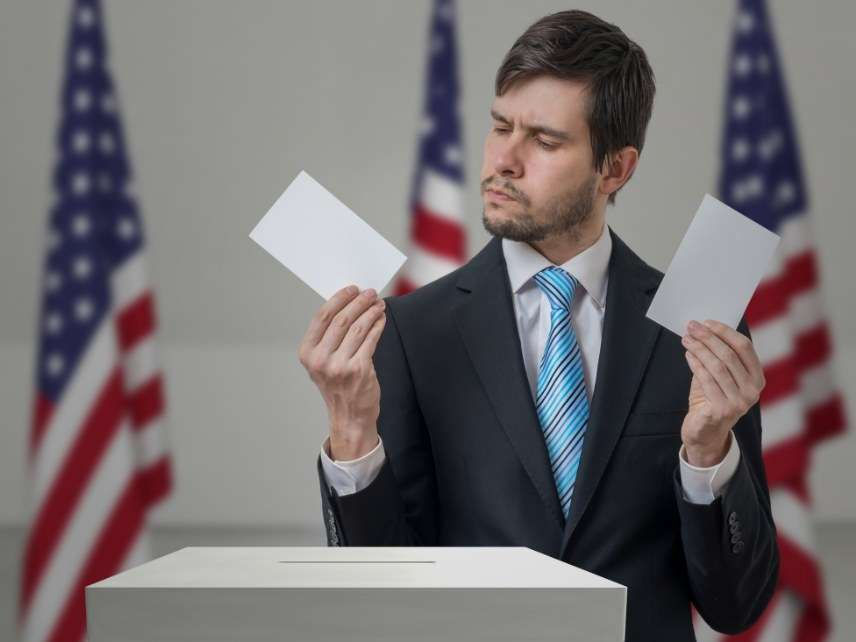Ranked-Choice Voting in Maine May Affect House Race Results
- OurStudio

- Nov 7, 2018
- 4 min read

Vchalup / Dreamstime.com
Maine's new method of voting for Congressional candidates may well change the outcome of the race to represent the state's Second District.
Right now, with 78 percent of the vote cast, incumbent Republican Rep. Bruce Poliquin has a tiny lead over Democrat Jared Golden, 46.2 percent to 45.7 percent. The problem for Poliquin, though, is that he doesn't have more than 50 percent of the vote, and with Maine's new ranked-choice voting system, that means he cannot yet be declared the winner.
There are two other independent candidates in the race, Tiffany Bond and William Hoar, and between the two of them they've got 8.1 percent of the vote. The independent votes are keeping either the Democrat or Republican from getting a majority win.
Under Maine's ranked-choice system, assuming the rest of the votes don't give either of the front-runners a majority victory, there's going to be an instant runoff. But voters will not have to return to the polls. When they voted Tuesday, they were asked to rank each of these candidates in order of preference (they didn't have to if they didn't want to; they could just choose one or rank just the ones they support). What will happen next is that the candidate with the fewest votes will be dropped from the race. Right now, that's Hoar. The ballots will then be recounted. For the 6,000 people who selected Hoar as their first choice, Maine will now count their second-ranked candidate as their choice for the House. And so a four-person race become a three-person race.
That still might not be enough to put either Poliquin or Golden above 50 percent. In fact, it seems very likely—Hoar is getting just 2.4 percent of the vote at the moment. So then, assuming Bond is still in third, she'll be dropped from the race and we'll go through another round of vote tallying. For anybody who voted for Bond, the person they ranked next will be their vote. Then with just two people left in the race, obviously one of them will have to hit the 50 percent threshold. In the end, even though Poliquin is ahead this first round, he could end up losing to Golden if more of Bond's and Hoar's voters ranked Golden higher.
This system has been put into play by Maine voters via ballot initiative partly as a way of encouraging voter participation and third-party candidate participation and to encourage Democratic and Republican Party candidates to consider more than just partisan turnout. Some cities have ranked-choice voting for local elections. Maine is the first to attempt it for wider races. The intent is to make it so that people don't feel as though they're "throwing their vote away" by choosing a third-party or independent candidate. They can still then select a more mainstream candidate as their second choice.
It's certainly not perfect though. For any voters who selected only Hoar and declined to rank the others, their ballots will be "exhausted," fundamentally meaning that it's the same as voting for a fringe candidate in a winner-takes-all race. But that would have happened anyway in the more typical voting system.
The big test will be if the switch to ranked-choice voting brings out more voters and if those voters are happier with the outcome, even if their first choice didn't win. It may be tough to determine if ranked-choice changed turnout this election because it appears midterm participation is up across the country this year compared to previous elections. Maine's secretary of state predicted record turnout for this year's midterms.
Yesterday's ranked-choice voting only applied to U.S. Senate and House races (independent progressive incumbent Sen. Angus King easily won majority vote against libertarian-leaning Republican Eric Brakey and Democrat Zak Ringelstein). Voters in Maine actually want ranked-choice voting to apply to state government races as well, but the state's constitution clearly states that only a plurality is needed to win state-level elections. It will have to be amended to fully implement the will of the voters. Currently gubernatorial front-runner Democrat Janet Mills is above the 50 percent threshold and if the numbers stand, she'd win without the ranked-choice system playing a role, even if it had applied to the governor's race.
As we watch Maine's experiment in ranked-choice voting play out, voters in Fargo, North Dakota, have decided to support a new and different way of handling local elections. By a vote of 64 percent, citizens in Fargo have decided to adopt approval voting for city elections.
For approval voting ballots, citizens are asked to mark each candidate they approve of, not just one. In a city council race with five candidates, for example, a voter could support just one of them, or several of them, or even all of them. When the ballots are tallied, the candidate with the most approval votes wins.
This is another mechanism that makes it possible to vote for third-party or independent candidates without the problem of throwing votes away. It's supported by The Center for Election Science, who put out a release last night cheering on the voters.
"Fargo voters have chosen a practical solution to the plights that come with our terrible choose-one voting method," Center Director Aaron Hamlin said. "They are armed against vote splitting and spoilers. And they've equipped themselves with a tool to elect strong candidates, encourage diverse ideas in campaigns, and permit support for favorite candidates without worry about viability."
Fargo will be the first city in the United States to introduce approval voting and it will affect the next race for city commissioner in 2020.




Comments